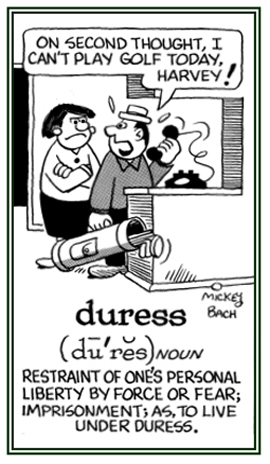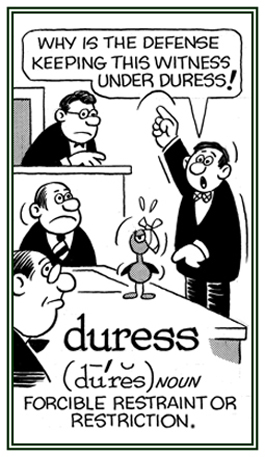duro-, dur-, dura-
(Latin: hard [as wood], lasting; thick, tough)
2. Grimly and stubbornly determined: The football player was in a dour mood when he tried to run for the goal with the football.
3. Marked by sternness or harshness; a forbidding nature: The people had dour feelings when they returned to see the results of the flooding of their homes.
The politician had a dour personality when he heard about the comments made about him by his opponent.
4. Etymology: "severe", from Scottish and northern England dialect, considered to be from Latin durus "hard"; the sense of "gloomy" is from about 1470.The pronunciation of dour traditionally rhymes with "tour"; as with DOER. The variant pronunciation that rhymes with "sour" (DOUR) is also considered to be widely used and so it is also considered an acceptable pronunciation by some authorities.


Go to this Word A Day Revisited Index
for a list of additional Mickey Bach illustrations.
While the dura mater is lining the inside of the skull, it is supporting the cranial sinuses or channels, and allows blood to be carried from the brain to the heart.
Folds of the dura mater partly separate the cerebral hemispheres from each other and the cerebrum (the largest and most developed part of the brain and the area where most conscious and intelligent activities occur) from the cerebellum (region of the brain that maintains posture and balance and the coordination of movements).
2. Etymology: from Latin dura mater; literally, "hard mother" and dura mater cerebri; "hard mother of the brain".Automobiles are known for their durability if they are serviced properly.
Porcelain enamel is a very strong and durable material to use for making expensive dishes, cups, decorations, etc.
2. Referring to something or someone staying strong and in good condition for a significant duration: Jerry was a durable athlete who has helped his football team win many games.
Go to this Word A Day Revisited Index
for a list of additional Mickey Bach illustrations.
2. A strong cloth, made of fake leather and used for clothing: At the clothing store, Judy saw a nice jacket in brown durance, or imitation suede, very similar to the shoes that she had at home.
Peggy was told by her physical trainer that she should gradually increase the duration of her workouts.
The TV cameras remained on the President for the duration of his speech.



